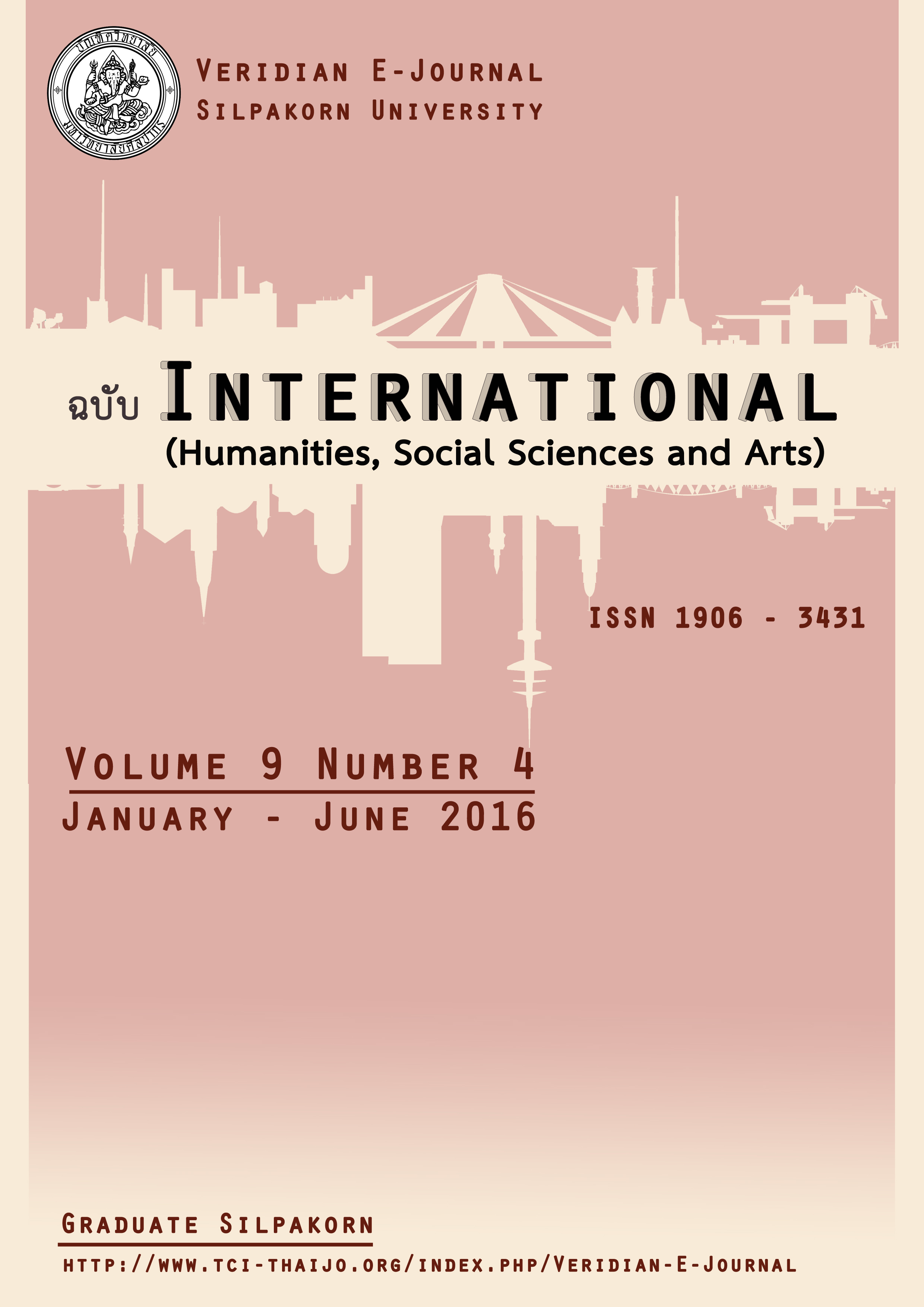Exploring Integrated Science Process Skills in Chemistry of High School Students
Main Article Content
บทคัดย่อ
One of the most important goals in science education is to develop students’ science process skills, which is inseparable from the content knowledge of science learning. Integrated science process skills are a part of an inquiry to understand science concepts at the high school level. This study aimed to explore high school students’ integrated science process skills in chemistry, which are identifying and controlling variables, formulating hypotheses, defining variables operationally, experimenting, interpreting data and making conclusions, and to examine the relationship between these five skills for improving chemistry learning activities. The Integrated Science Process Skills Test (ISPST) was developed by researchers and the reliability (KR20) of the test was 0.78. The ISPST was administered to three groups of 11th grade students (N=374) from the academic years 2012 to 2014. Data was analyzed by the use of Means, Kruskal-Wallis H Test, Mann-Whitney U Test, and Spearman's rho using SPSS. The results indicated that the students’ integrated skills were at a medium level. There was no significant difference at .05 level in their skills over three years, as well as no significant difference at the .05 level between male and female students. Each integrated skill had a significant and positive relationship, but at a low level (r=.126 - .419, p < .05). Surprisingly, the identifying and controlling variable skills had a very low (r=.126 -.160, p< .05) to no relationship (r=.044, p > .05) with the others. It is recommended that chemistry teachers should provide a classroom climate which helps develop integrated science process skills and include interrelated skills in practice.
การพัฒนาทักษะกระบวนการทางวิทยาศาสตร์เป็นเป้าหมายหนึ่งที่สำคัญของการจัดการเรียนรู้วิทยาศาสตร์ ซึ่งไม่สามารถแยกจากเนื้อหาความรู้ทางวิทยาศาสตร์ สำหรับในระดับมัธยมศึกษาตอนปลายทักษะกระบวนการทางวิทยาศาสตร์ขั้นบูรณาการเป็นส่วนสำคัญในการสืบเสาะเพื่อให้เกิดความเข้าใจแนวคิดทางวิทยาศาสตร์ งานวิจัยนี้จึงมีวัตถุประสงค์เพื่อสำรวจทักษะกระบวนการทางวิทยาศาสตร์ขั้นบูรณาการในเนื้อหาทางเคมีของนักเรียนระดับชั้นมัธยมศึกษาตอนปลาย ได้แก่ ทักษะการกำหนดตัวแปร ทักษะการตั้งสมมุติฐาน ทักษะการกำหนดนิยามเชิงปฏิบัติการ ทักษะการทดลอง และทักษะการตีความและลงข้อสรุป และศึกษาความสัมพันธ์ระหว่างทักษะขั้นบูรณาการทั้ง 5 ทักษะเพื่อนำมาใช้ในการปรับปรุงการจัดกิจกรรมการเรียนรู้เคมี เครื่องมือที่ใช้คือ แบบทดสอบทักษะกระบวนการทางวิทยาศาสตร์ขั้นบูรณาการซึ่งพัฒนาขึ้นโดยผู้วิจัย มีความเชื่อมั่น (KR20) เท่ากับ 0.78 เก็บข้อมูลกับกลุ่มตัวอย่างนักเรียนระดับชั้นมัธยมศึกษาปีที่ 5 จำนวน 374 คน ในปีการศึกษา 2555-2557 วิเคราะห์ข้อมูลโดยใช้โปรแกรมสถิติสำเร็จรูป ในการหาค่าทางสถิติได้แก่ ค่าเฉลี่ย การทดสอบของ Kruskal-Wallis การทดสอบของ Mann-Whitney U และสัมประสิทธ์สหสัมพันธ์สเปียร์แมน ผลการวิจัยพบว่าทักษะกระบวนการทางวิทยาศาสตร์ขั้นบูรณาการของนักเรียนอยู่ในระดับปานกลาง นักเรียนระดับชั้นมัธยมศึกษาปีที่ 5 ในแต่ละปีการศึกษาและเพศมีทักษะขั้นบูรณาการไม่แตกต่างกันที่ระดับ .05 และความสัมพันธ์ระหว่างแต่ละทักษะมีความสัมพันธ์กันอย่างมีนัยสำคัญที่ระดับ .05 ในทางบวกแต่อยู่ในระดับต่ำ (r=.126 - .419) โดยเฉพาะอย่างยิ่งทักษะการกำหนดและควบคุมตัวแปรมีความสัมพันธ์กับทักษะขั้นบูรณาการอื่น ๆ น้อยมาก ที่ระดับนัยสำคัญ .05 (r=.126 -.160) จนแทบไม่มีความสัมพันธ์ต่อกัน (r=.044, p > .05) ดังนั้นครูเคมีควรจัดบรรยากาศห้องเรียนที่ช่วยส่งเสริมการพัฒนาทักษะกระบวนการขั้นบูรณาการ รวมถึงการฝึกใช้ทักษะเหล่านี้แบบเชื่อมโยงมากขึ้น

